
quotations, religion, religious beliefs, einstein, mind of god
stephen hawkings god religion quotes beliefs believes quotations, religion, religious beliefs, einstein, mind of god |
| Home > Professor Stephen Hawking quotes on God and Religion |
|

|
The Times of London issue of 2 September 2010, a week prior to the publication of ~ The Grand Design ~ (and some two weeks prior to an high-profile papal visit to Britain), made front page news of Stephen Hawkings upcoming work and of his views on God and Creation.
Modern physics leaves no place for God in the creation of the Universe, Stephen Hawking has concluded.
A page that appeared on the BBC website on 2 September, 2010, the day the story about the imminent publication of The Grand Design made headline news, featured these quotes as background text:- There is no place for God in theories on the creation of the Universe, the physicist and mathematician Professor Stephen Hawking has said.The following quotation, delivered by Stephen Hawking during a very brief appearance on an accompanying on-line video about the new book, was explicitly announced, by the presenter of this news item, to be The Key Conclusion of The Grand Design:- "Because there are laws such as gravity, the universe can and will create itself from nothing. It is not necessary to invoke God to light the blue touch paper and set the Universe going."(The expression "to light the blue touch paper" is possibly something of an anglicism and is to do with the custom of lighting the fuses of fire-works in a garden setting).
Also in Black Holes and Baby Universes, Hawking goes so far as to attribute a marked increase in sales to this - discovery of a complete theory of everything means knowing the mind of God - quotation which was probably from his point a view nothing more than a metaphor indicative of an understanding of the universe which was complete and objective. "In the proof stage I nearly cut the last sentence in the book... Had I done so, the sales might have been halved."As sales of A Brief History of Time currently stand at over nine million copies Prof. Stephen decision not to edit out that sentence may have had notable consequences.
Stephen Hawking even goes so far in The Grand Design as to suggest that "Philosophy is Dead". Chapter I ~ The Mystery of Being ~ actually begins on this theme:- We each exist for but a short time, and in that time explore but a small part of the whole universe. But humans are a curious species. We wonder, we seek answers. Living in this vast world that is by turns kind and cruel, and gazing at the immense heavens above, people have always asked a multitude of questions: How can we understand the world in which we find ourselves? How does the universe behave? What is the nature of reality? Where did all this come from? Did the universe need a creator? Most of us do not spend most of our time worrying about these questions, but almost all of us worry about them some of the time.At Age-of-the-Sage we see relevance in God, Religion and Philosophy!!!
Is "Human Being" more truly Metaphysical than Physical?
Der Spiegel (17 October 1988)
In this article the Prof. was asked the following:- You use God as a metaphor for the laws of nature but, from what I remember, you are not religious in any way. Is this still the case? And Prof. Hawkings reply was:- "If you believe in science, like I do, you believe that there are certain laws that are always obeyed. If you like, you can say the laws are the work of God, but that is more a definition of God than a proof of his existence."
During the recording of this series Professor Hawking was asked whether he thought God existed. Hawkings reply, which like most of his statements had to be painstakingly pre-prepared and installed for playback through his voice synthesiser, was as follows:~ "The question is: is the way the universe began chosen by God for reasons we can't understand, or was it determined by a law of science? I believe the second. If you like, you can call the laws of science 'God', but it wouldn't be a personal God that you could meet, and ask questions." |
Human Existence
... you must take the whole society to find the whole man. Man is not a farmer, or a professor, or an engineer, but he is all. Man is priest, and scholar, and statesman, and producer, and soldier. In the divided or social state these functions are parcelled out to individuals, each of whom aims to do his stint of the joint work, whilst each other performs his.Ralph Waldo Emerson
Pythagoras also, in earlier times, advanced a similar view
of human nature.
In 518 B.C. Pythagoras travelled west and during his journey
reputedly had a significant interview with the prominent ruler
Leon of Philus whilst both were attending some public
Games.
King Leon was most impressed by Pythagoras' range of knowledge
and asked which of the arts he was most proficient in. Pythagoras
replied that, rather than being proficient in any art, he
regarded himself as being a philosopher.
King Leon had never heard this term before and asked for an
explanation.
This is the recorded reply:-
Life, Prince Leon, may well be compared with these public Games for in the vast crowd assembled here some are attracted by the acquisition of gain, others are led on by the hopes and ambitions of fame and glory. But among them are a few who have come to observe and to understand all that passes here. It is the same with life. Some are influenced by the love of wealth while others are blindly led on by the mad fever for power and domination, but the finest type of man gives himself up to discovering the meaning and purpose of life itself. He seeks to uncover the secrets of nature. This is the man I call a philosopher for although no man is completely wise in all respects, he can love wisdom as the key to nature's secrets.
Ancient, classical, Greek philosophy also evidences cogent suggestions that human nature is complex:-
Plato was a pupil and friend of the greek philosopher
Socrates. Amongst the many works attributed to Plato's authorship
is his "The Republic" wherein is set out a series of discourses
that allegedly took place between Socrates and a number of other
persons who variously arrived and departed as the discussions
continued.
It is in this record, made by Plato, of "Socrates? "
philosophising that most intriguing themes are developed -
...can we possibly refuse to admit that there exist in each
of us the same generic parts and characteristics as are found in
the state? For I presume the state has not received them from any
other source. It would be ridiculous to imagine that the presence
of the spirited element in cities is not to be traced to
individuals, wherever this character is imputed to the people, as
it is to the natives of Thrace, and Scythia, and generally
speaking, of the northern countries; or the love of knowledge,
which would be chiefly attributed to our own country; or the love
of riches, which people would especially connect with the
Phoenicians and the Egyptians.
Certainly.
This then is a fact so far, and one which it is not difficult
to apprehend.
No, it is not. ...
"You will hear things like, "Science doesn't know everything." Well, of course science doesn't know everything. But, because science doesn't know everything, it doesn't mean that science knows nothing. Science knows enough for us to be watched by a few million people now on television, for these lights to be working, for quite extraordinary miracles to have taken place in terms of the harnessing of the physical world and our dim approaches towards understanding it. And as Wittgenstein quite rightly said, "When we understand every single secret of the universe, there will still be left the eternal mystery of the human heart."
Stephen Fry quoting Wittgenstein during a Room 101 TV program
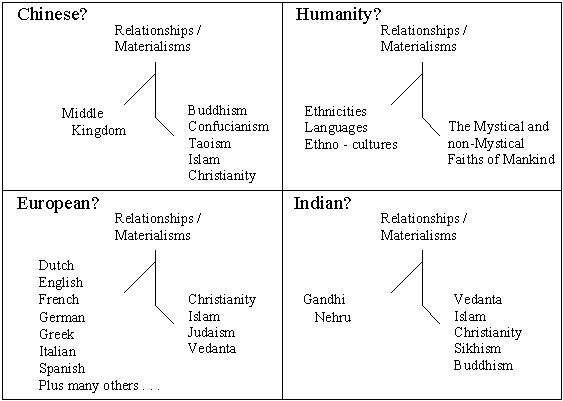 Faith and Philosophy!!! Our Human Nature - Tripartite Soul page Spirituality and the Wider World!!! People may well be spiritual, materialistic, ethnic and intellectual!!! |
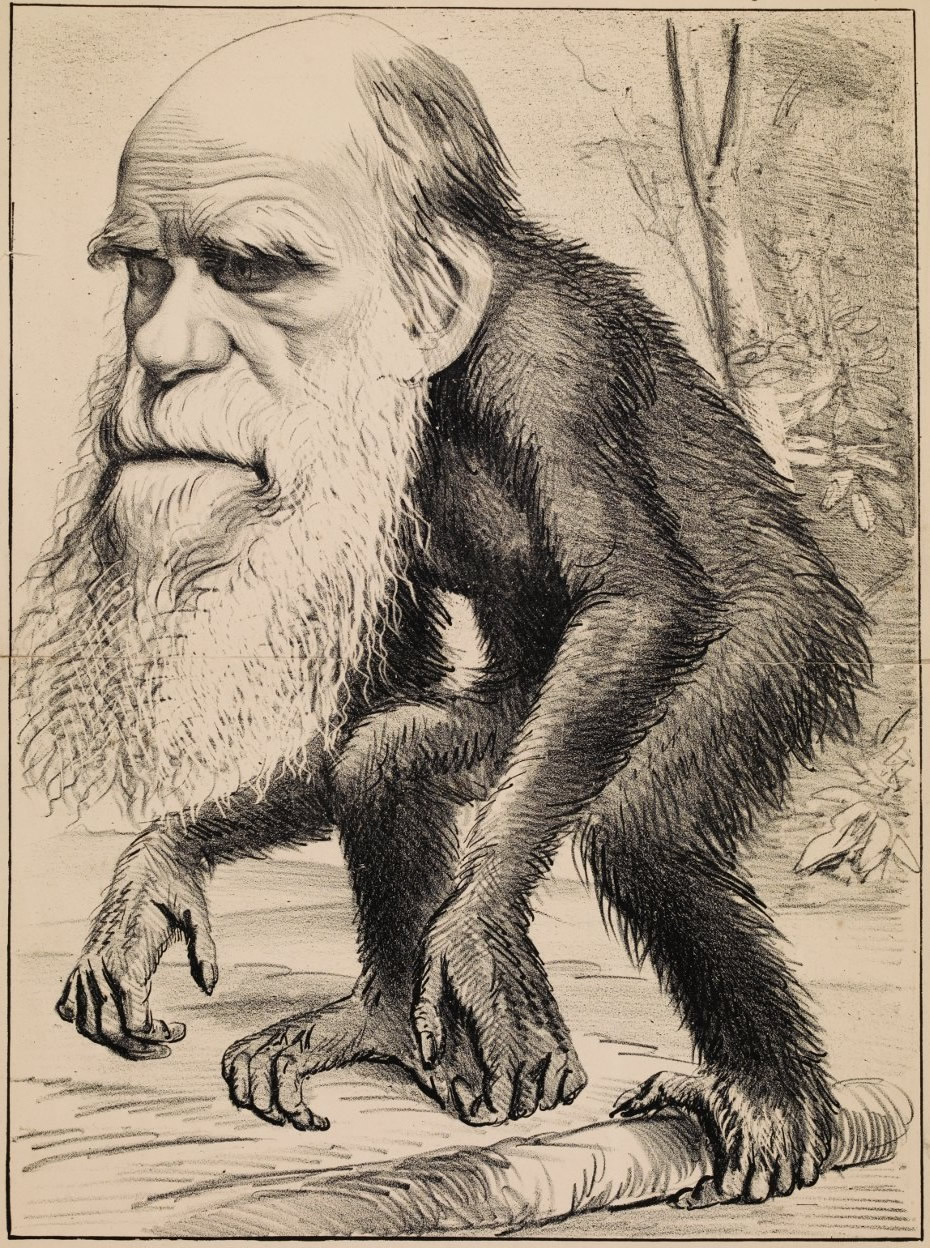 Popular, "Scientific", Rational, inadequate? ~ Darwinism Famous"Hornet" cartoon, 1871 (just after Darwin's ~ The Descent of Man) |
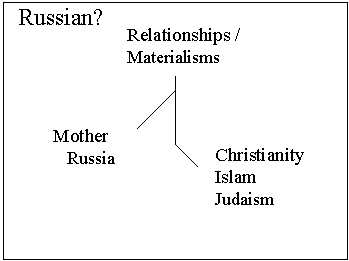
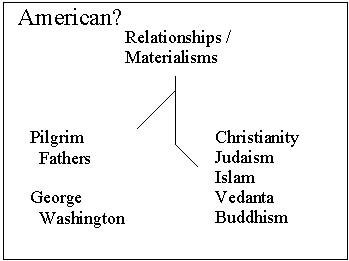
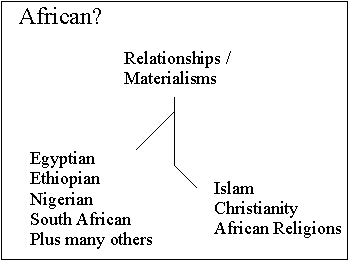

"...man is a bundle of relations, a knot of roots,
whose flower and fruitage is the world..."
Ralph Waldo Emerson
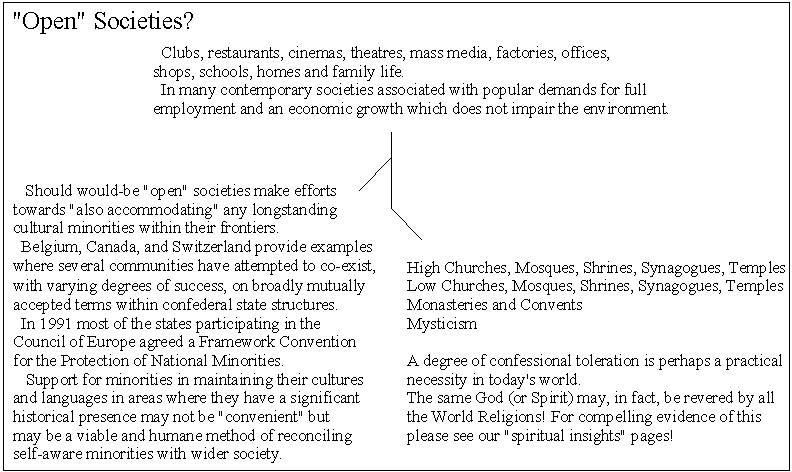
"Whatever concept one may hold, from a metaphysical point of view, concerning the freedom of the will, certainly its appearances, which are human actions, like every other natural event, are determined by universal laws. However obscure their causes, history, which is concerned with narrating these appearances, permits us to hope that if we attend to the play of freedom of the human will in the large, we may be able to discern a regular movement in it, and that what seems complex and chaotic in the single individual may be seen from the standpoint of the human race as a whole to be a steady and progressive though slow evolution of its original endowment."
Immanuel Kant
Idea for a Universal History from a Cosmopolitan Point of View (1784)
Or to quote Emerson, from his famous Essay ~ History more fully:-
"In old Rome the public roads beginning at the Forum proceeded north, south, east, west, to the centre of every province of the empire, making each market-town of Persia, Spain, and Britain pervious to the soldiers of the capital: so out of the human heart go, as it were, highways to the heart of every object in nature, to reduce it under the dominion of man. A man is a bundle of relations, a knot of roots, whose flower and fruitage is the world. His faculties refer to natures out of him, and predict the world he is to inhabit, as the fins of the fish foreshow that water exists, or the wings of an eagle in the egg presuppose air. He cannot live without a world."
![]()
"There is one mind common to all individual men....
....Of the works of this mind history is the record. Man is explicable by nothing less than all his history. All the facts of history pre-exist as laws. Each law in turn is made by circumstances predominant. The creation of a thousand forests is in one acorn, and Egypt, Greece, Rome, Gaul, Britain, America, lie folded already in the first man. Epoch after epoch, camp, kingdom, empire, republic, democracy, are merely the application of this manifold spirit to the manifold world."
From Ralph Waldo Emerson's Essay ~ History
![]()
"What lies behind you and what lies in front of you, pales in comparison to what lies inside of you."
Ralph Waldo EmersonMan's Divided ~ Multi-faceted ~ Nature?
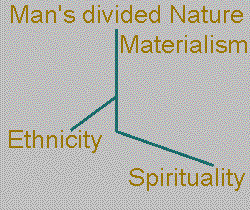
"Mankind are so much the same, in all times and places, that history informs us of nothing new or strange in this particular. Its chief use is only to discover the constant and universal principles of human nature."
David HumeWe have prepared some fairly meaty, but hopefully entertaining, pages about a most informative episode in European History in the spirit of attempting to learn worthwhile lessons of history about The Human Condition!!!The European Revolutions of 1848
A brief resume of some poetry quotations that may even qualify as being " Central Poetry Insights " is set out in the following scrollable panel:~
A brief resume of some spiritual quotations that may even qualify as being " Central Spiritual Insights " is set out in the following scrollable panel:~
Return to start of
Professor Stephen Hawking quotes
On God and Religion page